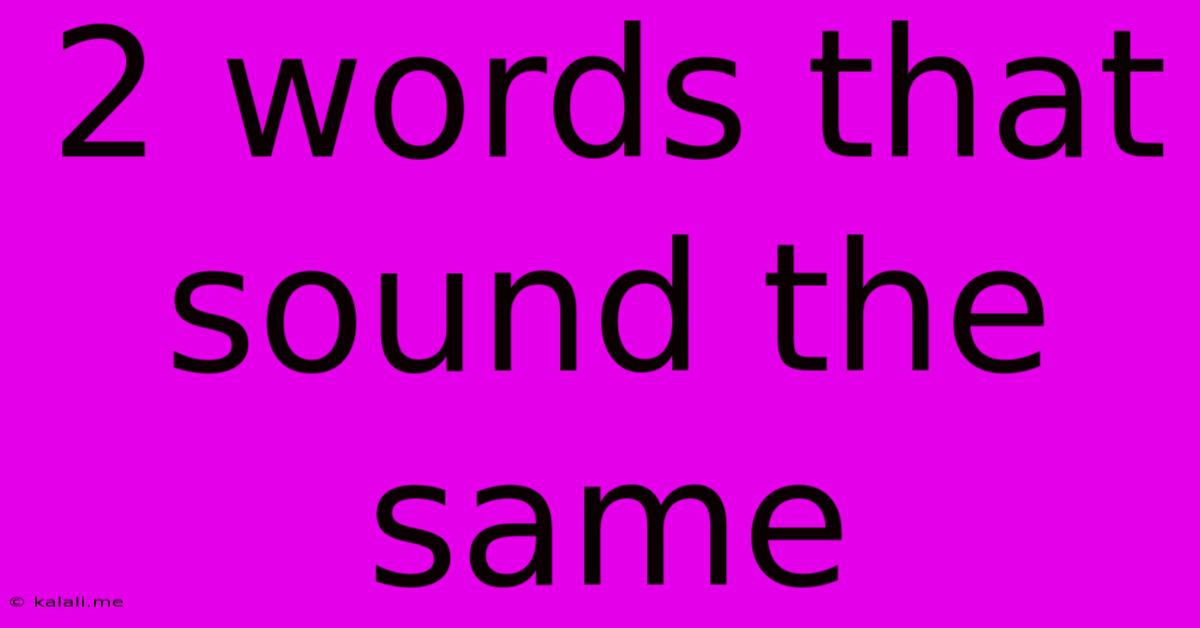2 Words That Sound The Same
Kalali
Jun 07, 2025 · 3 min read

Table of Contents
2 Words That Sound the Same: Exploring Homophones and Their Impact on Language
This article delves into the fascinating world of homophones – words that sound alike but have different meanings and spellings. Understanding homophones is crucial for both effective communication and successful writing, particularly in avoiding embarrassing spelling errors and ensuring clarity. We'll explore common examples, their impact on language evolution, and tips to avoid confusion.
What are Homophones?
Homophones are words that share the same pronunciation but have different meanings and, often, different spellings. These linguistic twins can be a source of both amusement and frustration, leading to misunderstandings and occasionally humorous misspellings. They represent a rich aspect of the English language, highlighting its complex and ever-evolving nature. Think of them as a playful challenge, forcing us to pay close attention to context and spelling to accurately convey our intended message.
Common Examples of Homophones
Many homophones are prevalent in everyday language, often causing confusion, especially for non-native English speakers. Here are some of the most frequently encountered examples:
-
Their, There, They're: This trio is perhaps the most infamous example. "Their" indicates possession, "there" indicates a place, and "they're" is a contraction of "they are."
-
Your, You're: Similarly, "your" shows possession, while "you're" is a contraction of "you are."
-
To, Too, Two: "To" is a preposition indicating direction or purpose; "too" means "also" or "excessively"; and "two" represents the number 2.
-
Hear, Here: "Hear" refers to the sense of hearing, while "here" indicates a location.
-
See, Sea: "See" refers to sight, while "sea" refers to the ocean.
The Impact of Homophones on Language Evolution
Homophones play a significant role in the evolution of language. Their existence highlights the dynamic nature of spoken and written language, where sounds can shift and meanings can diverge over time. The subtle phonetic variations that create homophones often reflect changes in pronunciation across different dialects and generations. Studying these changes can provide valuable insights into the historical development of language itself.
Avoiding Confusion with Homophones
Mastering the correct usage of homophones requires diligent attention to detail. Here are some practical tips:
-
Proofreading: Always proofread your work carefully. A second pair of eyes can often spot these easily overlooked errors.
-
Contextual Clues: Pay close attention to the context in which a word is used. The surrounding words and phrases will often provide clues as to the correct word.
-
Dictionary & Thesaurus Use: Don't hesitate to consult a dictionary or thesaurus if you're unsure about the correct spelling or meaning of a word. This habit is invaluable in improving writing accuracy.
-
Practice: The more you read and write, the more familiar you'll become with these tricky word pairs. Consistent practice is key to mastering their usage.
Conclusion
Homophones, while occasionally a source of frustration, are a fascinating aspect of the English language, reflecting its dynamism and evolution. By understanding their nuances and employing careful writing strategies, we can use these sound-alike words effectively, avoiding confusion and enhancing the clarity of our communication. Their presence reminds us of the importance of precise word choice and the ever-present need for careful proofreading in our written work.
Latest Posts
Latest Posts
-
Can I Use Potato Starch Instead Of Cornstarch
Jun 08, 2025
-
What Tribe Of Israel Am I Descended From
Jun 08, 2025
-
How Do You Take Off Restricted Mode On Youtube
Jun 08, 2025
-
Why Apple Chargers Dont Work On Windowa
Jun 08, 2025
-
When To Paint Pressure Treated Lumber
Jun 08, 2025
Related Post
Thank you for visiting our website which covers about 2 Words That Sound The Same . We hope the information provided has been useful to you. Feel free to contact us if you have any questions or need further assistance. See you next time and don't miss to bookmark.